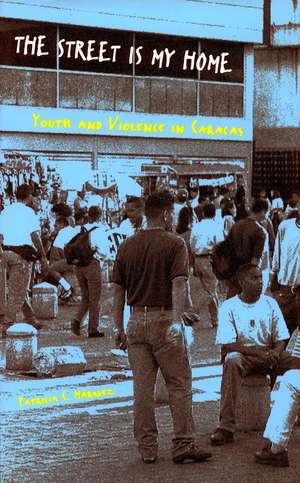The Street Is My Home: Youth and Violence in Caracas
Autor Patricia Márquezen Limba Engleză Paperback – 30 noi 2002
What does it mean to be a child or an adolescent growing up on the streets or in a state institution? How do children define their everyday lives in the midst of global processes? This ethnographic study situates childhood and adolescence as social forms within the changing family and political structures of the complex urban world of Caracas, Venezuela.
The presence of youngsters on the streets of Caracas embodies social contradictions at the national level, and this book discusses how these contradictions are played out in an oil-producing nation afflicted with hyperinflation, generalized corruption, the deterioration of public services, increasing poverty, and violence. Vivid life stories told by street children themselves portray their relations with family and friends, as well as with people they encounter: police officers, journalists, social workers, and passersby at their local hangouts. The book also describes and analyzes the justice system and institutions for minors, illustrating the constant failures to respond to, contain, or lessen youth violence.
Many young people come from shantytowns to the streets of Caracas for a better life, and the author shows how they seek status and power through style, pursuing commodities of the global consumer market, from Nike shoes to cellular phones. Drawing on her ethnographic data and contemporary theories of power, control, and style, the author critiques the inequalities of the Venezuelan class structure and the oil boom’s failure to provide adequate social services for a great majority of the population.
The presence of youngsters on the streets of Caracas embodies social contradictions at the national level, and this book discusses how these contradictions are played out in an oil-producing nation afflicted with hyperinflation, generalized corruption, the deterioration of public services, increasing poverty, and violence. Vivid life stories told by street children themselves portray their relations with family and friends, as well as with people they encounter: police officers, journalists, social workers, and passersby at their local hangouts. The book also describes and analyzes the justice system and institutions for minors, illustrating the constant failures to respond to, contain, or lessen youth violence.
Many young people come from shantytowns to the streets of Caracas for a better life, and the author shows how they seek status and power through style, pursuing commodities of the global consumer market, from Nike shoes to cellular phones. Drawing on her ethnographic data and contemporary theories of power, control, and style, the author critiques the inequalities of the Venezuelan class structure and the oil boom’s failure to provide adequate social services for a great majority of the population.
| Toate formatele și edițiile | Preț | Express |
|---|---|---|
| Paperback (1) | 220.91 lei 3-5 săpt. | |
| Stanford University Press – 30 noi 2002 | 220.91 lei 3-5 săpt. | |
| Hardback (1) | 774.07 lei 6-8 săpt. | |
| Stanford University Press – 30 apr 1999 | 774.07 lei 6-8 săpt. |
Preț: 220.91 lei
Nou
Puncte Express: 331
Preț estimativ în valută:
42.27€ • 45.20$ • 35.24£
42.27€ • 45.20$ • 35.24£
Carte disponibilă
Livrare economică 28 martie-11 aprilie
Preluare comenzi: 021 569.72.76
Specificații
ISBN-13: 9780804745529
ISBN-10: 0804745528
Pagini: 292
Dimensiuni: 127 x 203 x 18 mm
Greutate: 0.3 kg
Ediția:1
Editura: Stanford University Press
Colecția Stanford University Press
ISBN-10: 0804745528
Pagini: 292
Dimensiuni: 127 x 203 x 18 mm
Greutate: 0.3 kg
Ediția:1
Editura: Stanford University Press
Colecția Stanford University Press
Recenzii
"Centering on a series of dramatic life histories and interviews in which the street children provide stunningly insightful and poetically expressed analyses of their own situations, Márquez's book is compellingly written and excellently thought out, makes theoretical contributions, and portrays a fascinating situation with insights that will be useful to scholars in a variety of fields."—Linda-Anne Rebhun, Yale University
"The book's strength lies in the extraordinarily detailed and up-close look the reader receives of street life and its fragilities . . . in telling and at times graphic detail. . . . One of the most recent and best examples of what empirical studies of the Third World informal sector can be."—Qualitative Sociology
Notă biografică
Patricia C. Márquez is Associate Professor in the Department of Organizational Behavior at the Instituto de Estudios Superiores de Administración (IESA), Caracas.
Textul de pe ultima copertă
“Centering on a series of dramatic life histories and interviews in which the street children provide stunningly insightful and poetically expressed analyses of their own situations, Márquez’s book is compellingly written and excellently thought out, makes theoretical contributions, and portrays a fascinating situation with insights that will be useful to scholars in a variety of fields.”—Linda-Anne Rebhun, Yale University
“The book’s strength lies in the extraordinarily detailed and up-close look the reader receives of street life and its fragilities . . . in telling and at times graphic detail. . . . One of the most recent and best examples of what empirical studies of the Third World informal sector can be.”—Qualitative Sociology
“The book’s strength lies in the extraordinarily detailed and up-close look the reader receives of street life and its fragilities . . . in telling and at times graphic detail. . . . One of the most recent and best examples of what empirical studies of the Third World informal sector can be.”—Qualitative Sociology
Descriere
What does it mean to be a child or an adolescent growing up on the streets or in a state institution? How do children define their everyday lives in the midst of global processes? This ethnographic study situates childhood and adolescence as social forms in the complex urban world of Caracas, Venezuela.









